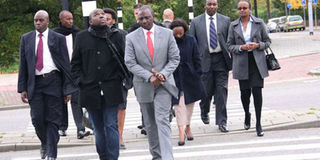Violence victims may never get justice, but ICC was not in vain

Deputy President William Ruto (centre) arrives at the International Criminal Court at the Hague where he is facing trials alongside journalist Joshua arap Sang on October 22, 2013. PHOTO | BILLY MUTAI | NATION MEDIA GROUP
What you need to know:
- As the cases wobble on, the ICC faces the sobering reality that not only did it fail in its core aim of delivering justice to the victims, but that its very interventions were exploited by a few civil society honchos as vehicles for political and economic gain.
- The ICC cases might not stop future electoral violence but will most likely change its nature and character.
- Even if the cases fail, the parading of Kenya’s top political elite in a court of law has already sent a very unambiguous message.
A few days ago, newspapers reported that Deputy President William Ruto and radio presenter Joshua arap Sang had inched closer to acquittal for crimes against humanity charges after the International Criminal Court Appeals Chamber reversed an earlier decision that allowed the use of recanted evidence.
This observation was based on ICC Prosecutor Fatou Bensouda’s own admission that her case against the accused would collapse without this evidence. However, whether the case collapses or not, the long-term ramifications on the court itself, on Kenya as a country, and the continent as a whole cannot be ignored.
First, the Kenyan cases have disrupted the notion of the “good” civil society as a countercheck to “evil” government. After the 1990s wave of democratisation that swept across much of sub-Saharan Africa, the consensus among Western donors was that civil society would be the ideal platform of policy prescription to improve governance in African states.
This thinking perceived the State as bad and civil society as inherently good. However, the hordes of witnesses recanting their evidence citing criminal inducements is beginning to reveal the rent-seeking, cold, and calculating habits of a handful of civil society groups.
As the cases wobble on, the ICC faces the sobering reality that not only did it fail in its core aim of delivering justice to the victims, but that its very interventions were exploited by a few civil society honchos as vehicles for political and economic gain.
Second, the ICC cases might not stop future electoral violence but will most likely change its nature and character. Even if the cases fail, the parading of Kenya’s top political elite in a court of law has already sent a very unambiguous message.
For long seen as above the law, the political class is now increasingly conscious of how to mobilise politically without preying on nasty identity politics. This means that while post-electoral violence might still occur in isolated places, it will most likely lack elite support due to ICC’s obsession with perceived members of that group as opposed to the more lethal but local, nondescript war lords.
RE-COLONISING INSTRUMENT
Without intending it, the ICC has also helped Kenya to punch above its weight in regional and global politics. Although intellectuals like Thabo Mbeki and Mahmood Mamdani had long accused the ICC of being a re-colonising instrument clothed in “humanitarian intervention”, it was the Kenyan cases that pushed this debate to the most important platforms.
President Kenyatta used his position as both president and an accused person to launch the most scathing attacks on the court and to rally the continent to a potential mass walkout from the Rome Statute. Frankly, a mass walkout will be difficult to accomplish, but the mere fact that regional powerhouses such as South Africa are already pulling out of the statute has helped build Mr Kenyatta’s perceived regional clout.
More important, it is forcing the ICC to look more closely at non-State actors such as Al-Shabaab, Isis, Boko Haram, and other insurgent groups upon whom sentiments of culpability are widely agreed. Furthermore, a recent report that the ICC is investigating the conduct of British soldiers in Afghanistan is evidence that the court is attempting to shed the “African bias” tag.
However, the most important but often unheralded impact of the ICC is how it has changed the presidency under the Jubilee administration. The cloud of “illegitimacy” that the Jubilee leadership bore as a result of the ICC indictments earlier in its term imposed on it a strong proclivity for local and offshore recognition and an abiding obsession with mega projects.
Consequently, there is an unprecedented sense of urgency around tasks and big projects held up as evidence of performance and monuments of reclaiming legitimacy.
Since independence, no government has been as task-focused as the Jubilee one. Notwithstanding corruption scandals, the dogged determination to deliver laptops, set up commuter trains, and work through multiple mega projects has gone hand in hand with a consistent pattern of hosting international events and world leaders.



